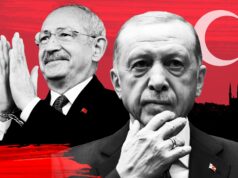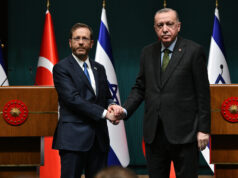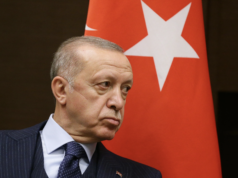The two powerful earthquakes that struck Turkey and Syria on February 6, and their dozens of aftershocks—which killed more than 40,000 people and left at least two million homeless, mostly in the former—should cause Americans “to rethink everything we thought about Turkey,” says Mark Meirowitz.
A professor of foreign policy, U.S.-Turkish relations, American history, and the Constitution at State University of New York’s Maritime College, Meirowitz told more than 100 participants on a Jewish Policy Center webinar February 16 that given the scope of the disaster “we really are in unknown territory” when it comes to evaluating the quakes’ effect on Turkey and Turkish society.
President Recep Tayyip Erdogan, whose government faces widespread criticism over slow initial recovery efforts and charges of allowing substandard construction that may have contributed to the devastation, has promised to rebuild all lost housing, Meirowitz noted. Estimates already put the cost of doing so at one percent of gross domestic product. The Wall Street Journal reported total projected infrastructure damage, including housing, roads and bridges at $84 billion.
Possible postponement of May or June’s presidential elections is opposed by opposition parties, Meirowitz said. The Turkish constitution prohibits cancellation of elections except in case of war, which does not now apply, he added.
Then there’s the question, “how do you set up elections” when many regions have been destroyed? Right now, “the Turkish “people are shell-shocked.”
One result of the quake may be improvement in Ankara’s relationships with some neighbors, Meirowitz said. International relief efforts have included aid from Armenia, Greece and Israel, with all of whom Turkey under Erdogan has had tension-filled if not adversarial relations, he noted.
Israel was an early leader in relief efforts, including dispatching a field hospital and 450 aid personnel. “The Turkish people saw it,” Meirowitz said. “I think the atmospherics are extremely good” for improved relations.
That doesn’t mean Ankara is about to expel Hamas, the terrorist Palestinian Islamic Resistance Movement that rules the Gaza Strip and operates in Turkey, said Meirowitz. He agreed with questioners that Erdogan worked “opportunistically” to position his country as a key international player, citing the Turks’ middleman role dealing with Russia and Ukraine, for example.
Turkey, a NATO member, continues to block Sweden’s application to join the U.S.-led North Atlantic Treaty Organization. Finland and Sweden both applied after Russia invaded Ukraine, a non-member, last year. Bringing in the two Nordic nations together “is important in pushing back on Russia,” Meirowitz said. “I’m optimistic about it … Turkey needs to get goodwill from the Europeans.”
And, “Turkey wants F-16s [fighter planes] from the United States. … If Turkey approves Sweden, I think a lot of opposition in Congress will dissipate.” This despite congressional lobbying by Armenia and Greece, which could change if relations among the countries improve.
Washington prohibited sales of American’s most advanced combat aircraft, the F-35, to Ankara after Erdogan purchased S-400 air defense systems from Russia. The United States fears S-400s in proximity to F-35s could compromise the planes’ secret technologies, Meirowitz noted. Turkey said it bought the Russia system after the United States during the Obama administration refused to supply it with Patriot air defense missiles.
Russia and Turkey are at odds in Syria, the former backing the regime of Bashar al-Assad, the latter opposed and pursuing its own war against the Turkish PKK (Kurdish Workers Party). Ankara and Washington consider PKK a terrorist movement. But the United States backs the YPG (Kurdish Protection Units) in Syria, which fought ISIS. Ankara views the YPG as a PKK affiliate.
“Turkey’s problem is, it doesn’t want Syrian Kurds to create their own sovereign state in Syria,” Meirowitz said. “Turkey’s very disappointed and upset with America’s chummy behavior with the YPG.”
Regardless, “out of this horrible earthquake, people opened their eyes” and see the Turks as people more than as a problem, he said. Turkey, realizing that “yes, we have friends,” may enable better relations with neighboring countries and the United States to develop.





